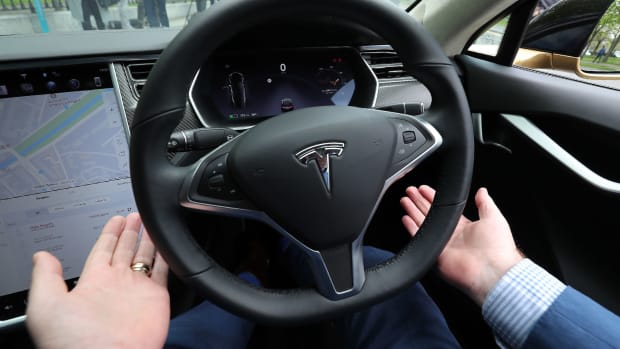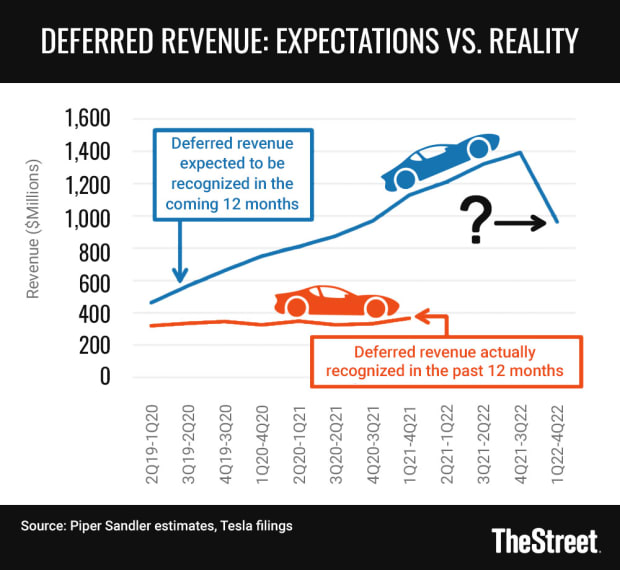Elon Musk made a particular product the star of Tesla's (TSLA) earnings conference call at the end of January.
He was full of praise for the impact this product would have on Tesla's financial performance in the years to come.
It is an understatement to say that he was dithyrambic. But as Musk's critics have often learned the hard way, his predictions and bets often pay off.
The full-self-driving feature will become Tesla's first engine of growth, Musk told analysts on Jan. 26.
"Full-self-driving. So, over time, we think full-self-driving will become the most important source of profitability for Tesla. It's -- actually, if you run the numbers on robotaxis, it's kind of nutty -- it's nutty good from a financial standpoint," Musk said.
To convince his audience, the billionaire claimed that Tesla cars would be able to drive themselves by the end of the year, thus rekindling hopes of seeing self-driving cars on the roads very soon after years of false hopes
"I would be shocked if we do not achieve full-self-driving safer than a human this year. I would be shocked," Musk said.
He added: "And I think we are completely confident at this point that it will be achieved. And my personal guess is that we'll achieve full-self-driving this year, yeah, with data safety level significantly greater than the present.
"So it's -- you know, the cars in the fleet essentially becoming self-driving by a software update, I think, might end up being the biggest increase in asset value of any asset class in history. We shall see."
Is Tesla Losing Faith in Full-Self-Driving Forecast?
Realizing these big promises is going to take longer than Musk wants.
Tesla said last week in a Securities and Exchange Commission filing that it now expected $962 million in deferred revenue this year. That includes revenue activity related to the access to its supercharger network, internet connectivity, full-self-driving features and over-the-air software updates on automotive.
"Of the total deferred revenue on automotive sales with and without resale value guarantees as of Dec. 31, 2021, we expect to recognize $962 million of revenue in the next 12 months," the company wrote.
However, according to Piper Sandler's analyst Alexander Potter, this projection is clearly down compared to what had been advanced three months earlier.
"On the Q4 call, Tesla was bullish [about] prospects for full self-driving (FSD) software in 2022," Potter said in a research note. "But based on the 10-K, expectations for FSD revenue recognition may have slipped."

Niall Carson/PA Images via Getty
He points out that three months earlier the projection was $1.39 billion. The recent drop is therefore out of phase with the enthusiasm Musk displayed at the end of January.
"When Tesla sells an FSD-equipped vehicle, about 50% of the FSD price is NOT booked as revenue. Some of the revenue is parked on the balance sheet as a liability because FSD isn’t ready yet," Potter explained.
He adds: "Margins will jump when FSD revenue is unlocked, but Tesla may be losing faith in its forecast."
Therefore, he urges investors and the millions of Musk fans to lower their expectations somewhat: "Elon Musk is bullish" on "the prospects for FSD in 2022, but don’t get too excited just yet."

TheStreet
What Is the Full-Self-Driving Function?
It's important to note that Musk has made promises about self-driving cars. He first did it in 2016 and did it again in 2018. In April 2019, he went so far as to predict one million self-driving Tesla cars on the roads in 2020.
Full-self-driving is a system of driving-assistance features, like automatically changing lanes, making turns, and parking.
FSD has sophisticated features like smart summon, which enables drivers to call their cars from parking spots to come pick them up, using their smartphones and the Tesla app like a remote control. Its price has climbed 50% in just over five years. It costs an additional $12,000, or a $199-a-month subscription.
But full-self-driving does not make Tesla vehicles fully autonomous.
"With the FSD computer, we expect to achieve a new level of autonomy as we gain billions of miles of experience using our features. The activation and use of these features are dependent on achieving reliability far in excess of human drivers, as well as regulatory approval, which may take longer in some jurisdictions," Tesla warned.
Potter, however, remains optimistic about full-self-driving's prospects.
"We don't mind waiting a bit longer for FSD," he said. "We’re unconcerned; it’s worth waiting a few more quarters (or years) for 90%+ margin revenue."
Rising interest rates, inflation and market volatility are on the horizon. You don’t want to miss out on this exclusive opportunity to unlock Action Alerts PLUS at our lowest price of the year.







